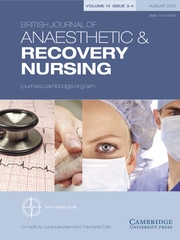Article contents
The Concerns of Recovery Practitioners Assisting in the Care of ICU Patients
Published online by Cambridge University Press: 25 February 2009
Extract
When high dependency and intensive care units are full, which occurs more and more often nationally, recovery wards are being utilised to hold critically ill patients. Recovery practitioners are often expected to assist in the care of these patients.
A small study established the views of a sample of recovery practitioners regarding the recovery unit being used as stop-gap, or ICU overflow. There were positive and negative opinions from recovery practitioners who were involved in the care of these critically ill patients. Recovery practitioners often reported feeling inexperienced and ill equipped, with increased levels of stress when working in the ICU bay. Only 20% of recovery practitioners in the study, expressed optimism about working in the ICU bay, and 60% identified that training and development was a strategy which may help to overcome some of their perceived problems.
This paper reports these concerns and identifies strategies which have been implemented to address some of these concerns.
- Type
- Research Article
- Information
- Copyright
- Copyright © British Association of Anaesthetic and Recovery Nursing 2001
References
references
- 1
- Cited by




